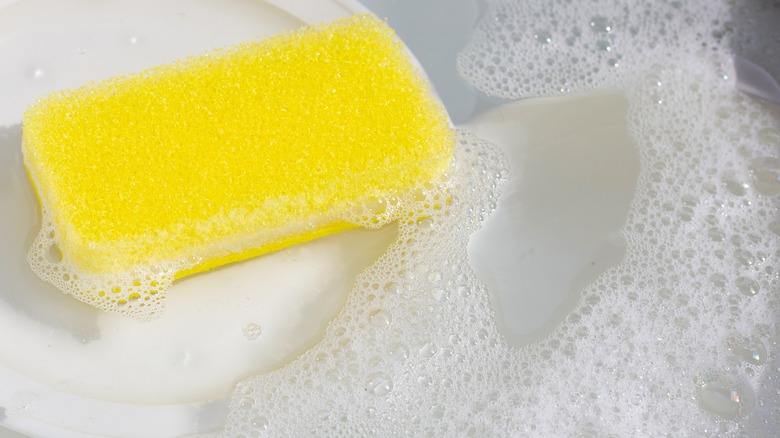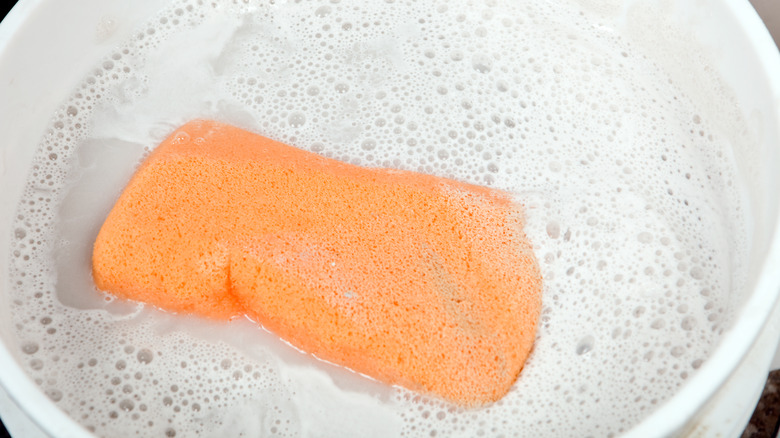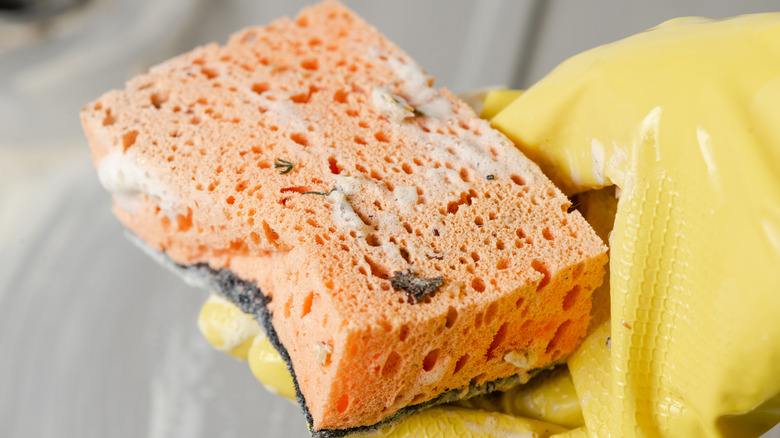The Secret Ingredient To Bring Your Sponges Back To Life
Health is wealth, and that's why keeping your home clean means sanitizing every inch of it, from your bathroom to your bedroom to your kitchen. While it's important to make sure every nook and cranny of your house receives some good ol' loving with your broom and mop, there are some cleaning utensils you probably overlook. For example, you probably don't give much attention to the kitchen sponge, even though you use it to wash dishes every single day. If you're guilty of using kitchen sponges for extended periods of time without cleaning them, then it's high time you do so. The antibacterial solution bound to give your sponge the deep cleanse it needs is rubbing alcohol.
Would you enjoy a refreshing drink of water out of your toilet? Probably not. And yet, washing your dishes, including your cups, with the same kitchen sponge you've been using for weeks essentially leads to the same result. According to a 2017 study published by Scientific Reports, your sponge may contain over 360 species of bacteria with 54 billion of them on every cubic centimeter of the kitchen utensil, per Science News. You might tell yourself that washing it with soap and water will keep it clean, but that's not going to get rid of all of the germs. You may want to think twice before reusing your sponges around the house for weeks without properly cleansing them with rubbing alcohol.
Soak the sponge in rubbing alcohol
If you're the kind of person who doesn't throw your sponge out until it has completely disintegrated, it's time for repentance and redemption. The ideal practice would be to throw away the sponge and replace it about every week. Unfortunately, that would mean buying 52 sponges every year, and the good ones aren't cheap. Instead, disinfecting them with rubbing alcohol is a more pocket-friendly solution, and you should disinfect your kitchen sponge once a week to maintain cleanliness. Rubbing alcohol that has at least a 60% concentration is best, as it kills a lot of common disease-causing bacteria such as E. coli and salmonella, as well as a host of other viruses and pathogens.
To disinfect your kitchen sponge, get a bottle of at least 60% rubbing alcohol. Place the sponge inside a small, airtight container, fill it up with alcohol, and then seal it up. Make sure the sponge is soaked and leave it for about 30 minutes to an hour before removing. The airtight container will prevent the alcohol from evaporating. Once the time is up, squeeze the sponge out and use it like you normally would. Although rubbing alcohol is generally safe on your hands, you're better off wearing rubber gloves while squeezing out the sponge because too much exposure could cause rashes or irritation.
What happens when you don't clean your sponge?
Let's be honest — kitchen sponges go through a lot. They're the real MVPs of the cooking arena. Not only do they help us keep our dishes clean, but they also wipe down surfaces like the stove and oven and trap all that oil, food debris, and spills. If a sponge is left to stew in dirty water overnight, it becomes an even more likely breeding ground for all types of pathogens. Soaking your sponge in rubbing alcohol works because alcohol denatures the proteins that house the internal components or organelles of bacteria and viruses (via Healthline). Since they can't possibly survive after being stripped of their membrane, they die, which is why the hack is so effective.
When you're done with the dishes, wash, rinse, and wring out the sponge completely and place it somewhere it can dry until it's ready to be disinfected. Additionally, you can further reduce the chance of nasty bacteria developing on your sponge by segregating sponges that come in contact with meat. Never use the same sponge to wash containers that housed raw meat to scrub your normal plates and utensils. Ideally, you can use paper towels to wipe up meat juice from countertops and containers before going in with soap and water and then your sponge. But even when you're segregating your sponges and allowing them to dry, it's still important to clean them regularly with rubbing alcohol to avoid the spread of bacteria.


